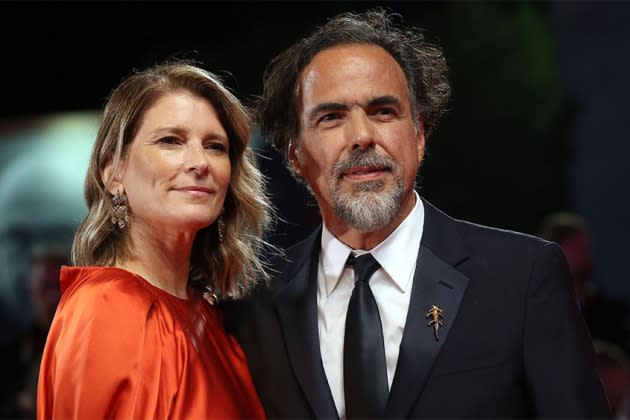Alejandro G. Iñárritu Gets Teary-Eyed as Three-Hour ‘Bardo’ Nabs Four-Minute Standing Ovation in Venice
- Oops!Something went wrong.Please try again later.

Will “Bardo” be Alejandro González Iñárritu’s third best director Oscar in a row following “Birdman” and “The Revenant” wins? It’s a question many were asking heading into the Venice Film Festival, where the Netflix-backed “Bardo” world premiered in competition.
They had plenty of time to contemplate their answer as the three-hour-film wrapped at 12:15 a.m. Venice time, and earned a standing ovation of just over four minutes at the Sala Grande. A number of audience members began leaving before the movie ended given the extremely late hour, but the vast majority showed up for the helmer and stayed to applaud him right to the bitter end.
More from Variety
'The Crown' Casts Prince William, Kate Middleton in Season Six
Timothèe Chalamet Blasts Social Media Negativity: 'It's Tough to Be Alive Now'
Iñárritu was visibly moved by the reception to his film, certainly one of his most personal efforts to date, and had tears in his eyes as he embraced his cast and producers. “Bardo” is his first feature film since 2015’s “The Revenant.”
The film, which has drawn comparisons to Federico Fellini’s opus “8 1/2,” has so far garnered mixed reviews, but the Venice audience appeared to stay with the film (there were minimal walkouts), delighting in Iñárritu’s visual spectacles that were at times meandering but often profound and affecting.
Written by Iñárritu and Nicolás Giacobone, who previously collaborated on Oscar winner “Birdman,” “Bardo” chronicles the story of a Mexican journalist and documentary filmmaker, who returns home and works through an existential crisis as he grapples with his identity and family relationships. The film stars Daniel Giménez Cacho and Griselda Siciliani. Notably, “Bardo” marks Iñárritu’s return to Mexico since his breakout feature directorial debut “Amores perros.”
The film’s 174-minute runtime will no doubt put some viewers off, and there are vast, meditative portions of the movie that are unnecessarily drawn out. But at the heart of it, “Bardo” is a story about identity, home and family. Some of the movie’s most affecting scenes aren’t the historical or the Fellini-esque, phantasmagoric set pieces (where you really see that Netflix money on screen), but rather the quiet moments between Giménez Cacho’s Los Angeles-based journalist Silverio and his two kids, discussing Mexico and their conflicted identities.
“Bardo” is Iñárritu’s first Venice Film Festival world premiere, and the second this year for Netflix, which on Wednesday premiered Noah Baumbach’s “White Noise.” The streamer will be back next week for Andrew Dominik’s “Blonde.” All three films are competing for the Golden Lion.
“Alejandro is one of the greatest modern filmmakers and one of the leading visionaries in our industry,” said Netflix Head of Global Film Scott Stuber when the streamer picked up the drama. “‘Bardo’ is a cinematic experience that has inspired us to create a release strategy designed for the film to penetrate culture in the biggest and widest way. We will give film lovers everywhere the opportunity to experience the film through a global theatrical release and the film’s worldwide release on Netflix. Having known Alejandro for a long time, I am personally very excited to finally be able to work alongside him and to bring his film to a global audience.”
Iñárritu’s last feature, “The Revenant,” earned 12 Academy Award nominations and won him the best director prize. “Birdman” won Best Picture in 2015 and scored 9 total nominations. It was Iñárritu’s first best director win. Iñárritu’s career has been defined by his collaborations with cinematographer Emmanuel Lubezski, but for “Bardo” he teamed up with Darius Khondji.
“Bardo” will debut in theaters and stream on Netflix later this year.
Best of Variety
'The Sopranos' Gets the Funko Pop Treatment in New Collectibles Release
From 'The Sandman' to 'Blonde': Books Made Into Movies and TV Series That You Should Read
Jennette McCurdy's Provocative Book 'I'm Glad My Mom Died' Is Already a No. 1 Bestseller
Sign up for Variety’s Newsletter. For the latest news, follow us on Facebook, Twitter, and Instagram.
